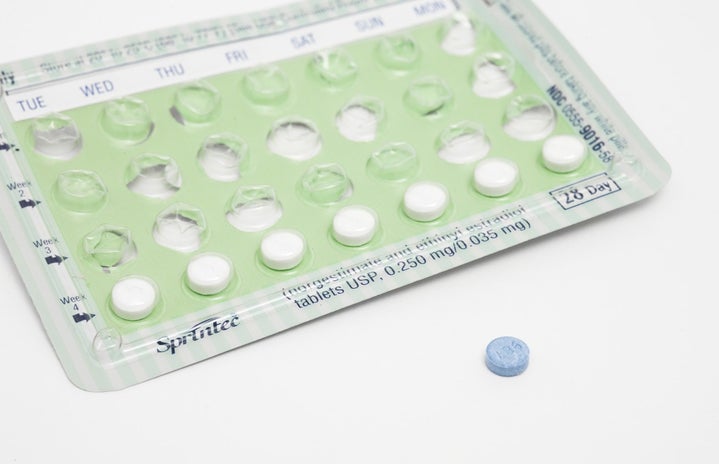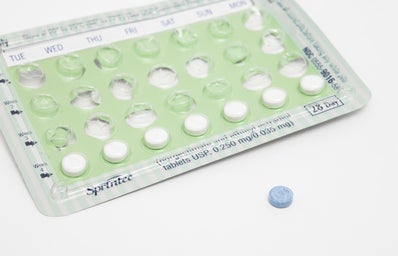By the time we’re in college, we all know the drill: we PMS, we get our period, most of us have mild to moderate cramping for a few days, the period ends. Repeat every month. For some girls, though, this pattern might suddenly change—and turn into a much more painful experience. A period accompanied by abnormally severe cramps might indicate something else is at play. Her Campus talked to Dr. Alain Joffe, medical director of the Johns Hopkins University Student Health and Wellness Center about what conditions appear to be just bad cramps, but are actually something else entirely. Read on to decipher if your cramps are normal or worthy of medical attention.
According to Dr. Joffe, normal menstrual cramps are cramps that last for a few days and respond well to painkillers, birth control or other self-care like heating pads. If you’ve suddenly got cramps that won’t go away, you need to seek out a doctor. Read on for the medical conditions that can make cramps worse for collegiettes.
1. Pelvic Inflammatory Disease
“PID is an infection of the uterine lining, and [the infection] spreads out and involves the fallopian tubes,” Dr. Joffe says. PID is a disease that often can be a complication of STDs like chlamydia and gonorrhea—but PID is not an STD itself because there are other ways to get it, such as pelvic surgery or a complication of an intrauterine device. “What happens is the germs live in the cervix, [women] get their period, and germs gain access up into the uterus. Menstrual blood is a good culture for STDs. Germs go into uterus and the infection starts,” Dr. Joffe says. PID will cause increased menstrual cramping, as well as a fever, vaginal discharge and pelvic pain.
According to Dr. Joffe, any sexually active woman is at risk, especially if you have many sexual partners. “You can decrease your risk by using condoms and getting tested on a regular basis,” he says. The difference between PID and run-of-the-mill menstrual cramps? “The way that you’ll know: [periods are] usually the worst during the first day or two and then it gets better. With PID, exactly the opposite happens. The cramps get worse,” Dr. Joffe says. If your cramps follow this pattern, make an appointment with a gynecologist immediately as PID can lead to other serious risks like pelvic pain and infertility. PID can be treated with antibiotics or surgery, depending on the severity of the case.
2. Ectopic Pregnancy
Pregnancies usually develop in the uterus—but that isn’t always the case. Sometimes, for reasons doctors aren’t exactly sure about, a pregnancy can occur outside the uterus, usually in the fallopian tubes. One of the symptoms of an ectopic pregnancy is severe menstrual cramps—ones that require the immediate attention of a doctor.
You’ll be able to differentiate ectopic pregnancy from severe cramps because the ectopic pregnancies result in cramping on one side of the body. The cramps will also be accompanied by typical pregnancy symptoms like breast tenderness and nausea. If you’re unsure if you could be pregnant, and your period cramps are intense, go to an emergency room as ectopic pregnancies can be life-threatening. Women are at risk if they have had pelvic inflammatory disease, endometriosis or have had past surgeries or infections in the abdominal region. Although your body could be going through an ectopic pregnancy, you could still get vaginal bleeding and cramping. While not a “real” period, these symptoms can confuse girls into thinking they’re just having a bad period, instead of being pregnant.
3. Ovarian torsions and cysts
Your ovaries play an important role in your monthly cycle, so it’s no surprise that any sort of problem with them can cause major havoc. Though doctors don’t know why, occasionally ovaries can rotate out of their proper place—this is called an ovarian torsion. “Sometimes it just happens, sometimes there’s something wrong with the ovary,” says Dr. Joffe. One possibility? An ovarian cyst could cause the ovary to rotate out of alignment. Cysts are build-ups of tissue that are actually completely normal (you’ve probably had a few, just never known it!) but when they get big, they can rupture. When that happens, severe menstrual cramps happen.
You’ll be able to tell the difference between a normal period cramp and a cyst or torsion by assessing the location and severity of the pain. “[The pain is] much more intense. It’s more localized,” Dr. Joffe says. You’ll probably only feel it on one side and the cramps will be incredibly painful. Your doctor will likely recommend an ultrasound. Cysts and torsions are scary and painful, but there’s great treatment available: you might have to surgically remove the cyst or, if it hasn’t ruptured, birth control helps your body from forming them in the first place. “I’ve had severe menstrual cramps for a while and after a pelvic ultrasound, it turns out I have a cyst on my ovary,” Lauren, a collegiette from Duke, says. I also have personally have had an ovarian cyst the size of a lemon rupture! In high school, I had extremely intense lower abdominal pain that I incorrectly assumed was just cramps—an ultrasound later confirmed that I had an abnormally large ovarian cyst that had ruptured, causing severe pain. Though the experience was incredibly painful and scary, just a simple, noninvasive surgery instantly stopped the pain.
4. Endometriosis
Dr. Joffe says the top three causes for increased severity of cramps are PID, ectopic pregnancy and ovarian cysts—but that doesn’t mean other things can’t affect your cramps. Endometriosis, for instance, is a condition where uterine tissue grows outside the uterus—bad cramps often follow. However, this is a condition that typically appears earlier than college. You would likely have symptoms of this throughout your life—it’s not a condition that typically just happens after you’ve had your period for several years.
5. Less likely conditions: PCOS, cancer and organ abnormalities
Other possibilities include ovarian or cervical cancer, but Dr. Joffe says these are extremely rare in college students, so don’t assume you have a tumor if your cramps get worse! Additionally, polycystic ovarian syndrome can also cause cramps, but Dr. Joffe says this condition will more likely present with irregular periods or no periods at all. Another possibility is that there is a problem with your cervix, uterus, or ovaries due to improper formation; this is especially likely if you only have one kidney since these organs develop at the same time. These conditions are less likely to just “pop up” in a college-aged woman, Dr. Joffe says, but if you’re concerned, a trip to the doctor can give you peace of mind.
The takeaway? There’s no foolproof way to know what’s making your cramps worse. Your best bet is to seek out a professional opinion at your student health center or a gynecologist who can figure out what’s really going on or at least point you in the right direction. When you go to your doctor, don’t let them just prescribe you painkillers if you think something is really wrong. Demand an ultrasound or other testing—these conditions are too often not found because doctors might not take your cramps seriously But, as Dr. Joffe says, if you suddenly feel like you’re experiencing the worst cramps of your life, don’t delay medical attention—go to an emergency room immediately.
So, collegiettes, if your period cramps have started intensifying, get off WebMD and seek out a doctor! There’s probably an easy solution and you can go back to having (relatively) pain-free periods!

